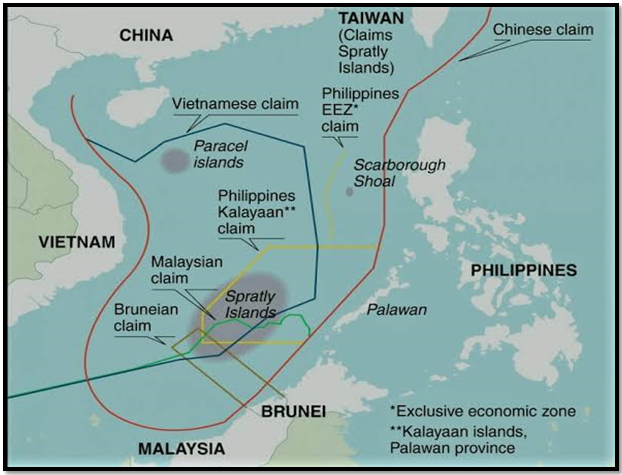PHILIPPINES’ DUAL ENGAGEMENT
Syllabus:
GS 2:
- International Relations
- Effect of Policies and Politics of Developed and Developing Countries on India’s interests.
Why in the News?
Tensions in the South China Sea have escalated due to confrontations between Chinese maritime forces and Philippine fishing boats. President Ferdinand Marcos Jr.’s assertive stance and bolstered ties with the U.S. mark a significant shift in the Philippines’ foreign policy, impacting regional dynamics.
Source: Medium
Political Shift
- Assertive Leadership: President Ferdinand Marcos Jr. values security ties with Washington over Beijing’s development funds, marking a shift from his predecessor Rodrigo Duterte.
- Strengthened Alliances: The U.S.-Philippines relationship has improved significantly since Marcos Jr.’s 2022 electoral victory.
- Strategic Dialogue: At the Shangri-La Dialogue in Singapore, Marcos Jr. criticized China’s aggressive actions in the South China Sea.
- China’s Response: China labels Marcos Jr. as an American pawn, akin to Taiwan’s former President Tsai Ing-wen, suggesting he incites regional conflict.
- Rising Tensions: Encounters between Chinese maritime militia and Philippine boats have heightened regional tensions, with potential for conflict escalating.
| Philippines-China Dispute :
Contesting Claims on Scarborough Shoal
|
American Stakes
- Mutual Defense Treaty: The U.S. has had a defense treaty with the Philippines since 1951, but remains cautious about direct conflict with China.
- Resident Americans: Approximately 400,000 U.S. citizens, including many veterans, live in the Philippines, highlighting the country’s importance to America.
- Strategic Location: The Philippines’ position in the South China Sea is crucial for the U.S.’s Indo-Pacific strategy against China.
- Military Modernization: Marcos Jr. approved a $35 billion military acquisition plan to boost surveillance and power projection capabilities.
- Reviving Bases: The Philippines plans to modernize Subic Bay and Clark Air Base, increasing their strategic military significance.
Quad Support:
- BrahMo s Missiles: India delivered BrahMos launchers and missiles to the Philippines, reinforcing military capabilities.
- Legal Backing: India supports the 2016 Tribunal ruling against China’s territorial claims, strengthening diplomatic ties with the Philippines.
- Japanese Aid: Japan provides coastal surveillance radars and patrol ships to bolster the Philippines Coast Guard.
- Australian Assistance: Australia, a major aid donor, supports the development of the Philippines’ naval and coast guard capabilities.
- South Korean Collaboration: South Korea aids in developing coast guard vessels, further enhancing maritime security.
Economic Dependence on China:
- Financial Support: Despite military tensions, the Philippines relies on substantial financial aid from China, totaling $9.1 billion between 2000 and 2022.
- Vice Presidential Connection: Sara Duterte, the Vice President and daughter of former President Duterte, underscores the continuing political ties with China.
- Balance Challenge: The dual engagement with U.S. military support and Chinese economic aid presents a complex balancing act for the Philippines.
- Strategic Impact: Increasing friction with China may reduce financial flows from Beijing but strengthen military ties with the U.S. and Quad partners.
- Future Uncertainty: The sustainability of this dual engagement remains uncertain as geopolitical dynamics evolve.
Regional Dynamics:
- Conflict Potential: The risk of conflict in the South China Sea grows with China’s aggressive actions and the Philippines’ assertive responses.
- U.S. Caution: While supporting Marcos Jr., the U.S. is wary of being drawn into a direct naval conflict with China.
- Enhanced Capabilities: The Philippines’ military modernization efforts aim to bolster its defense against potential Chinese aggression.
- Strategic Importance: The Philippines’ geographic location makes it a pivotal player in the Indo-Pacific region, impacting broader geopolitical strategies.
- Alliance Strengthening: The evolving regional dynamics underscore the importance of solidifying alliances with the U.S. and Quad partners to counterbalance China’s influence
Steps for India to Take
- Strengthen Diplomatic Relations: Enhance diplomatic ties with the Philippines and other Southeast Asian nations to foster regional stability and counterbalance China’s influence.
- Military Cooperation: Increase military cooperation with the Philippines through joint exercises, defense technology transfers, and capacity-building initiatives to enhance maritime security.
- Economic Engagement: Boost economic ties with the Philippines by investing in infrastructure, trade, and development projects to reduce Manila’s dependency on Chinese financial aid.
- Support Regional Security: Play a proactive role in regional security forums like ASEAN and the Quad to advocate for a rules-based order in the South China Sea and support freedom of navigation.
- Technological Collaboration: Collaborate on technological advancements in defense and surveillance to help the Philippines strengthen its maritime domain awareness and response capabilities.
- Legal Support: Continue to support international legal rulings and conventions, such as the 2016 Tribunal ruling, to uphold the Philippines’ territorial rights and challenge China’s expansive claims.
- Humanitarian Aid: Provide humanitarian assistance and disaster relief to the Philippines to build goodwill and strengthen bilateral relations, showcasing India’s commitment to regional solidarity and support
Conclusion
India must strategically enhance its diplomatic, military, and economic engagements with the Philippines to counterbalance China’s influence in the region. Strengthening regional security and supporting the Philippines’ sovereignty will contribute to a stable and rules-based Indo-Pacific, aligning with India’s broader strategic interests
Source:The Hindu
Mains Practice Question:
Discuss the strategic importance of the Philippines in the Indo-Pacific region and the steps India should take to enhance its bilateral relations with Manila, considering the current geopolitical tensions in the South China Sea.
Associated Article:




